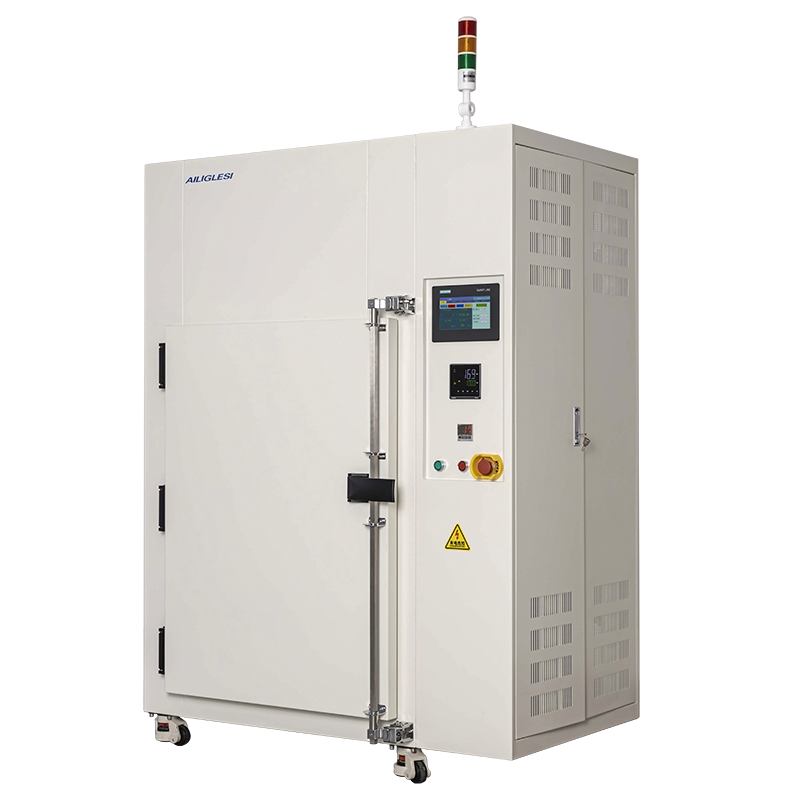เตาอบอุตสาหกรรม มีบทบาทสําคัญในการผลิตที่ทันสมัย คุณเชื่อมั่นกับพวกเขาสําหรับผู้หญิงของพวกเขา การใช้งาน วงกว้างตั้งแต่การรักษาด้วยความร้อนจนถึงกระบวนการแห้งและการรักษา ความสามารถในการรักษาอุณหภูมิที่แม่นยํา ให้ผลผลิตอย่างคงที่และมีคุณภาพสูง กระบวนการควบคุมอุณหภูมิในเตาอบเหล่านี้ มีผลต่อประสิทธิภาพโดยตรง ช่วยให้คุณประหยัดพลังงาน และลดการเสีย โดยการควบคุมอุณหภูมิ คุณสามารถปรับปรุงการผลิต และบรรลุมาตรฐานสินค้าที่ดีกว่าในหลายสาขา
เตาอบอุตสาหกรรมคืออะไร และความสําคัญของมัน
คํานิยามและประเภทของเตาอบอุตสาหกรรม
เตาอบอุตสาหกรรมเป็นเครื่องมือที่จําเป็นในอุตสาหกรรมผลิตและการแปรรูป เตาอบเหล่านี้ผลิตความร้อนที่ควบคุมได้ เพื่อทําหน้าที่ เช่น การแห้ง การรักษาความแข็ง และการรักษาความร้อน การออกแบบและการทํางานของเครื่องยนต์ต่างกันไปตามความต้องการของอุตสาหกรรม โดยทําให้มันสามารถใช้ได้ในหลายๆ การใช้งาน
เครื่องอบชุด
เตาอบชุดแปรรูปวัสดุในภาระส่วนตัว คุณใส่วัสดุ หมุนเวียนการทําความร้อน และถอนมันเมื่อกระบวนการเสร็จสิ้น เตาอบเหล่านี้เหมาะสําหรับการผลิตขนาดเล็กหรือกระบวนการที่ต้องการความยืดหยุ่น มันทําให้คุณสามารถจัดการกับวัสดุต่างๆ หรือ สินค้า โดยไม่ต้องใช้งานต่อเนื่อง
เครื่องอบอุ่นต่อเนื่อง
เตาอบต่อเนื่องทํางานไม่หยุด ทําให้มันเหมาะสําหรับการผลิตขนาดใหญ่ วัสดุเคลื่อนไหวผ่านเตาอบบนระบบขนส่ง เตาอบประเภทนี้ช่วยให้คุณประหยัดเวลา และรักษาผลผลิตอย่างคงที่ โดยเฉพาะในอุตสาหกรรมเช่น การแปรรูปอาหาร หรือการผลิตรถยนต์
เครื่องอบเฉพาะ (เช่น เครื่องอบแอกุศกะ, เครื่องอบห้องสะอาด)
เตาอบพิเศษตอบสนองความต้องการอุตสาหกรรมที่พิเศษ เตาอบสูบขัดลมและความชื้น ทําให้เหมาะสําหรับวัสดุที่อ่อนแอหรือกระบวนการ เช่น การแห้งอิเล็กทรอนิกส์ เตาอบห้องสะอาดรักษาสภาพแวดล้อมที่ไม่ติดเชื้อ ซึ่งเป็นสิ่งสําคัญในอุตสาหกรรม เช่น ยาหรือเครื่องบิน เตาอบเหล่านี้ทําให้คุณมีความแม่นยําและมีความน่าเชื่อถือ สําหรับงานเฉพาะ
ความสําคัญของเตาอบอุตสาหกรรมในอุตสาหกรรมผลิต
เตาอบอุตสาหกรรมมีบทบาทสําคัญในการผลิตที่ทันสมัย มันเพิ่มประสิทธิภาพ การันตีคุณภาพสินค้า และสนับสนุนการใช้งานที่หลากหลายในอุตสาหกรรมต่างๆ
การเพิ่มประสิทธิภาพกระบวนการ
เตาอบอุตสาหกรรมทําให้กระบวนการผลิตของคุณเรียบง่าย พวกมันส่งความร้อนที่คงที่ ลดเวลาและความพยายามที่จําเป็นสําหรับงาน เช่น การรักษาหรือการแห้ง โดยใช้เตาอบเหล่านี้ คุณสามารถเพิ่มผลผลิต และลดเวลาหยุดทํางานให้น้อยที่สุด ซึ่งช่วยให้คุณบรรลุเป้าหมายการผลิตได้อย่างมีประสิทธิภาพมากขึ้น
การรับประกันคุณภาพสินค้าที่คง
การควบคุมอุณหภูมิอย่างแม่นยํา จะทําให้การทําความร้อนเป็นแบบเดียวกัน ซึ่งเป็นสิ่งสําคัญในการรักษาคุณภาพของผลิตภัณฑ์ ไม่ว่าคุณจะบํารุงเคลือบหรือแข็งโลหะ เฟอร์อุตสาหกรรมช่วยให้คุณได้รับผลผลิตอย่างต่อเนื่อง ความสม่ําเสมอนี้สร้างความไว้วางใจในสินค้าของคุณ และเสริมสร้างชื่อเสียงของคุณในตลาด
การสนับสนุนการใช้งานอุตสาหกรรมที่หลากหลาย
เตาอบอุตสาหกรรมปรับตัวให้กับอุตสาหกรรมและกระบวนการต่างๆ จากโลหะที่รักษาด้วยความร้อนไปยังการแห้งเซรามิค พวกเขานําเสนอทางออกสําหรับความต้องการที่หลากหลาย ความสามารถในการใช้งานของเครื่องยนต์เหล่านี้ ทําให้คุณสามารถรับมือกับโจทย์ต่างๆ ได้อย่างง่ายดาย ทําให้มันจําเป็นในภาคต่างๆ เช่น การผลิตรถยนต์ อิเล็กทรอนิกส์ และอาหาร
สอบการใช้งานของเตาอบอุตสาหกรรม
เตาอบอุตสาหกรรมให้บริการอุตสาหกรรมหลากหลาย โดยให้ความร้อนที่ควบคุมสําหรับกระบวนการต่างๆ การ ใช้ งาน ที่ หลากหลาย ทํา ให้ มัน สําคัญ ใน การ ผลิต การ วิจัย และ การ ปรับปรุง วัสดุ ด้านล่างคุณจะสํารวจการใช้งานหลักของเตาอบอุตสาหกรรมและวิธีที่พวกเขาส่งผลต่อกระบวนการที่แตกต่างกัน
กระบวนการบําบัดความร้อน
การบําบัดด้วยความร้อนมีส่วนเกี่ยวข้องกับการเปลี่ยนแปลงคุณสมบัติทางกายภาพและกลของวัสดุ เตาอบอุตสาหกรรมมีบทบาทสําคัญในการกระบวนการเหล่านี้ โดยการส่งความร้อนที่แม่นยําและคง
การปรับปรุง
การผสมผสมผสมผสมผสมผสมผสมผสมผสมผสมผสมผสมผสมผสมผสมผสม คุณสามารถใช้เตาอบอุตสาหกรรม เพื่อทําความร้อนวัสดุให้ถึงอุณหภูมิที่กําหนดไว้ แล้วทําให้มันเย็นลงช้า ๆ กระบวนการนี้ลดความเครียดภายในและเพิ่มความสามารถในการทํางานของวัสดุ ทําให้มันเหมาะสําหรับการปั้นหรือการแปรรูปต่อไป
การปรับปรุง
การทาจะเพิ่มความแข็งแรงของโลหะในขณะที่ลดความเปราะบาง การ ทํา ให้ ผนัง ที่ แข็งแรง หนา ลง เตาอบอุตสาหกรรมทําให้ความร้อนเป็นแบบเดียวกัน ซึ่งเป็นสิ่งจําเป็นสําหรับผลผลที่คง
การเสริมความแข็งแรง
การแข็งแรงทําให้โลหะแข็งแรง โดยการทํามันร้อนจนถึงอุณหภูมิสูง แล้วทํามันเย็นลงอย่างรวดเร็ว เตาอบอุตสาหกรรม ให้การควบคุมอุณหภูมิที่แม่นยําที่จําเป็นสําหรับกระบวนการนี้ วิธีนี้ทําให้แน่ใจว่าวัสดุจะบรรลุความแข็งที่ต้องการโดยไม่เสี่ยงความสมบูรณ์แบบของโครงสร้าง
การแห้งและการรักษา
เตาอบอุตสาหกรรมดีเยี่ยมในการใช้ในการแห้งและการรักษา ซึ่งเป็นสิ่งสําคัญในการกําจัดความชื้นและการทําให้เคลือบหรือเครื่องติด
การกําจัดความชื้นจากวัสดุ
การแห้งจะกําจัดความชื้นจากวัสดุ เช่น ไม้ เซรามิค หรือผ้า เตาอบอุตสาหกรรมรักษาอุณหภูมิที่คงที่ เพื่อให้ความชื้นระเหยได้อย่างเท่าเทียมกัน การทําแบบนี้ป้องกันความบกพร่อง เช่น การบิดหรือแตก ซึ่งอาจทําให้คุณภาพของสินค้าของคุณเสื่อม
การบํารุงความแข็งของเคลือบผิว, ผสมและผสม
การบํารุงความแข็ง ทําให้เคลือบผิว, ผสมและวัสดุประกอบแข็งด้วยการใช้ความร้อน เตาอบอุตสาหกรรม ให้สภาพแวดล้อมที่ควบคุมที่จําเป็นสําหรับกระบวนการนี้ ไม่ว่าคุณจะรักษาสีบนชิ้นส่วนรถยนต์ หรือเครื่องติดในอิเล็กทรอนิกส์ เฟ็นเหล่านี้ช่วยให้คุณได้รับผลงานที่ทนทานและน่าเชื่อถือ
การซินเตอร์และการแปรรูปวัสดุ
การทําซินเตอร์และการแปรรูปวัสดุรวมถึงการแปลงวัสดุแท้เป็นผลิตภัณฑ์ที่เสร็จสิ้น เตาอบอุตสาหกรรมทําให้กระบวนการเหล่านี้สามารถดําเนินการได้ โดยการส่งอุณหภูมิสูงให้ถูกต้อง
การปั่นโลหะและเซรามิก
การทําซินเตอร์ ทําให้ซารามิกหรือโลหะเป็นผงเป็นวัตถุแข็ง โดยทําให้มันร้อนต่ํากว่าจุดละลาย เตาอบอุตสาหกรรมให้ความจําแนกอุณหภูมิที่เท่าเทียมกัน ซึ่งเป็นสิ่งสําคัญในการบรรลุผลิตภัณฑ์ที่แข็งแรงและไร้ความบกพร่อง กระบวนการนี้ถูกใช้อย่างแพร่หลายในอุตสาหกรรม เช่น การผลิตเครื่องบินและอุปกรณ์การแพทย์
การใช้งานในงานโลหะแป้ง
โลหะข้นประกอบด้วยการปรับรูปร่างและแข็งข้นโลหะเป็นองค์ประกอบ เตาอบอุตสาหกรรมมีบทบาทสําคัญในกระบวนการนี้ โดยให้ความร้อนที่จําเป็นสําหรับการผูกส่วนละออง ผลลัพธ์คือชิ้นส่วนที่มีประสิทธิภาพสูง มีคุณสมบัติทางกลที่ดีเยี่ยม
เตาอบอุตสาหกรรมแสดงคุณค่าของพวกเขาในทุกการใช้งานเหล่านี้โดยการรับประกันผลลัพธ์ที่สม่ําเสมอและเพิ่มประสิทธิภาพ ความสามารถในการควบคุมอุณหภูมิที่แม่นยํา ทําให้มันเป็นเครื่องมือที่จําเป็นในการผลิตและการวิจัยที่ทันสมัย
การทดสอบและการวิจัย
เตาอบอุตสาหกรรมมีบทบาทสําคัญในการทดสอบและการนํามาใช้ในงานวิจัย พวกมันให้บริการกับสภาพแวดล้อมที่ควบคุมได้ ช่วยคุณในการประเมินคุณสมบัติของวัสดุ และจําลองสภาพแวดล้อมในโลกจริง ความสามารถเหล่านี้ทําให้มันเป็นเครื่องมือที่จําเป็นสําหรับนวัตกรรมและการรับประกันคุณภาพ
การทดสอบความร้อนของวัสดุ
การทดสอบความร้อนช่วยให้คุณเข้าใจว่าวัสดุตอบสนองกับความร้อนอย่างไร เตาอบอุตสาหกรรม ทําให้คุณเปิดเผยวัสดุให้มีอุณหภูมิที่กําหนดไว้ ทําให้คุณสามารถศึกษาความมั่นคงทางความร้อน การขยายตัว และการนําไฟ ข้อมูลเหล่านี้เป็นสิ่งสําคัญในการเลือกวัสดุที่เหมาะสมสําหรับโครงการของคุณ ตัวอย่างเช่น คุณสามารถทดสอบโลหะเพื่อความทนทานต่อความร้อน หรือประเมินพอลิมเลอร์เพื่อความละลายทางความร้อน โดยการใช้เตาอบอุตสาหกรรม คุณสามารถให้ผลผลที่แม่นยําและซ้ําได้ ซึ่งเป็นสิ่งสําคัญในการตัดสินใจที่รู้
การจําลองสภาพแวดล้อมสุดขั้วในการพัฒนาสินค้า
การพัฒนาสินค้ามักต้องทดสอบในสภาพที่รุนแรง เตาอบอุตสาหกรรมให้คุณจําลองสภาพแวดล้อมอุณหภูมิสูง เพื่อประเมินผลงานและความทนทานของสินค้า คุณสามารถจําลองกรณีต่างๆ เช่น การเผชิญกับความร้อนนาน หรือการเปลี่ยนแปลงอุณหภูมิที่รวดเร็ว นี่ช่วยคุณในการระบุจุดอ่อนที่เป็นไปได้ และปรับปรุงการออกแบบสินค้า ตัวอย่างเช่น วิศวกรอากาศใช้เตาอบอุตสาหกรรม เพื่อทดสอบส่วนประกอบเพื่อความทนความร้อนระหว่างการเข้าสู่อากาศใหม่ เช่นเดียวกัน ผู้ผลิต อิเล็กทรอนิกส์ ประเมินบอร์ดวงจรให้มีความน่าเชื่อถือในสภาพอุณหภูมิสูง การจําลองเหล่านี้ทําให้สินค้าของคุณตรงกับมาตรฐานของอุตสาหกรรม และทํางานได้อย่างน่าเชื่อถือในการใช้งานในโลกจริง
กระบวนการควบคุมอุณหภูมิในเตาอบอุตสาหกรรม
กระบวนการควบคุมอุณหภูมิในเตาอบอุตสาหกรรมให้ความมั่นคงในการทําความร้อนที่แม่นยํา ซึ่งเป็นสิ่งจําเป็นในการบรรลุผลที่คงที่เป็นไปและรักษาคุณภาพของผลิตภัณฑ์ โดยเข้าใจกลไกและเทคโนโลยีที่เกี่ยวข้อง คุณสามารถปรับปรุงการดําเนินงานของคุณและเพิ่มประสิทธิภาพ
อุปกรณ์ในการควบคุมอุณหภูมิ
เตาอบอุตสาหกรรม ใช้กลไกที่ทันสมัย เพื่อควบคุมอุณหภูมิให้ถูกต้อง ระบบเหล่านี้ทําให้ความร้อนที่ต้องการคงอยู่ตลอดกระบวนการ
เครื่องทําความร้อนและเซ็นเซอร์
เซ็นเซอร์และเทอร์โมคอปเปอร์วัดอุณหภูมิภายในเตาอบ มันให้ข้อมูลในเวลาจริง ทําให้คุณสามารถติดตามและปรับกระบวนการทําความร้อนตามความต้องการ เตอร์โมคอปเปอร์มีความทนทานและน่าเชื่อถือ ทําให้มันเหมาะสมสําหรับการใช้งานในอุณหภูมิสูง เซ็นเซอร์เพิ่มความแม่นยํา โดยการตรวจจับแม้แต่ความเปลี่ยนแปลงของอุณหภูมิขนาดเล็ก เพื่อให้ความร้อนเป็นแบบเดียวกัน
เครื่องควบคุม PID
เครื่องควบคุม PID (Proportional-Integral-Derivative) ปกครองอุณหภูมิโดยปรับอุปกรณ์ทําความร้อนของเตาอบ พวกมันวิเคราะห์ข้อมูลจากเซ็นเซอร์ และทําการเปลี่ยนแปลงที่แม่นยํา เพื่อรักษาอุณหภูมิที่กําหนดไว้ กลไกนี้ป้องกันการอุ่นเกินหรืออุ่นต่ํา ช่วยให้คุณได้รับผลที่คง เครื่องควบคุม PID ใช้กันอย่างแพร่หลาย เพราะมันให้ความสมดุลระหว่างความง่ายและประสิทธิภาพ
เครื่องควบคุมโลจิกที่สามารถเขียนโปรแกรมได้ (PLC)
PLC ทําให้กระบวนการควบคุมอุณหภูมิเป็นระบบอัตโนมัติ โดยการรวมฟังก์ชันหลายอย่างเข้ากับระบบเดียว มันทําให้คุณสามารถเขียนโปรแกรมโปรไฟล์อุณหภูมิเฉพาะสําหรับการใช้งานที่แตกต่างกัน ด้วย PLC คุณสามารถควบคุมการทําความร้อน การทําความเย็น และการกําหนดเวลาได้อย่างแม่นยํา ระดับอัตโนมัตินี้ลดความผิดพลาดของมนุษย์ และเพิ่มประสิทธิภาพในการดําเนินงานของคุณ
เทคโนโลยีเพื่อความแม่นยําและประสิทธิภาพ
เตาอบอุตสาหกรรมสมัยใหม่รวมเทคโนโลยีที่ทันสมัย เพื่อเพิ่มความแม่นยําและประสิทธิภาพพลังงาน นวัตกรรมเหล่านี้ช่วยให้คุณได้รับผลลัพธ์ที่ดีขึ้นในขณะที่ลดต้นทุนการดําเนินงานให้น้อยที่สุด
วัสดุประกอบความอุดมสมบูรณ์
วัสดุประกอบความร้อนที่มีความทันสมัย ลดการสูญเสียความร้อน ทําให้เตาอบมีอุณหภูมิคงที่ โดยใช้วัสดุเหล่านี้ คุณสามารถเพิ่มประสิทธิภาพพลังงาน และลดเวลาในการทําความร้อน การกันความร้อนยังป้องกันสิ่งแวดล้อมภายนอกจากความร้อนที่เกินขั้น และเพิ่มความปลอดภัยในสถานที่ทํางาน
ระบบติดตามในเวลาจริง
ระบบติดตามในเวลาจริง ให้ข้อมูลการทํางานของเตาอบ มันทําให้คุณสามารถติดตามอุณหภูมิ การใช้พลังงาน และปริมาตรอื่นๆ ด้วยข้อมูลนี้ คุณสามารถระบุปัญหาได้ในระยะต้น และปรับปรุงเพื่อให้กระบวนการดีที่สุด ระบบการติดตามยังช่วยให้คุณรักษาความสอดคล้องกับมาตรฐานของอุตสาหกรรม
อุปกรณ์ทําความร้อนประหยัด
อุปกรณ์ทําความร้อนที่ประหยัดพลังงาน ใช้พลังงานน้อยกว่าในขณะที่ส่งความร้อนที่คงที่ ส่วนประกอบเหล่านี้ลดต้นทุนพลังงาน และลดผลกระทบต่อสิ่งแวดล้อมให้น้อยที่สุด โดยการปรับปรุงขึ้นเป็นองค์ประกอบที่ประหยัดพลังงาน คุณสามารถปรับปรุงผลงานของเตาอบอุตสาหกรรมของคุณได้
ความสําคัญของความแม่นยําของอุณหภูมิ
การควบคุมอุณหภูมิที่แม่นยําเป็นสิ่งสําคัญในการบรรลุผลที่มีคุณภาพสูง และการปรับปรุงกระบวนการของคุณ มันส่งผลต่อประสิทธิภาพและความน่าเชื่อถือของการดําเนินงานของคุณโดยตรง
การป้องกันความบกพร่องของวัสดุ
ความแม่นยําของอุณหภูมิป้องกันความบกพร่อง เช่น การบิด, การแตก, หรือการรักษาที่ไม่เท่าเทียมกัน โดยการรักษาความร้อนอย่างต่อเนื่อง คุณสามารถทําให้แน่ใจว่าวัสดุจะยังคงมีคุณสมบัติที่ต้องการ ทําให้ลดการทิ้ง และเพิ่มความทนทานของผลิตภัณฑ์ของคุณ
การรับรองความสอดคล้องของกระบวนการ
การควบคุมอุณหภูมิอย่างต่อเนื่องทําให้แน่ใจว่า ทุกชุดจะตอบสนองมาตรฐานคุณภาพเดียวกัน ไม่ว่าคุณจะบํารุงเคลือบหรือปั่นวัสดุ, ความละเอียดจะกําจัดความแตกต่างในผลิตภัณฑ์สุดท้าย. การ ทํา อย่าง ที่ ไม่ แตกต่าง จะ ทํา ให้ ลูกค้า เชื่อใจ และ เสริม ชื่อเสียง ของ คุณ
ลดการใช้พลังงานและการเสีย
การควบคุมอุณหภูมิอย่างแม่นยํา ช่วยลดการใช้พลังงานให้น้อยที่สุด โดยหลีกเลี่ยงการร้อนเกิน มันยังลดการทิ้งของด้วยการป้องกันความบกพร่องของวัสดุและการทํางานใหม่ โดยการปรับปรุงกระบวนการควบคุมอุณหภูมิ คุณสามารถลดต้นทุนการดําเนินงานและส่งผลต่อความยั่งยืน
เตาอบอุตสาหกรรมแสดงความสามารถที่น่าทึ่งในการใช้งานหลายอย่าง โดยใช้เป็นเครื่องมือที่จําเป็นในกระบวนการอุตสาหกรรมที่หลากหลาย คุณพึ่งพาการพัฒนาเหล่านี้ เพื่อเพิ่มประสิทธิภาพ การปรับปรุงคุณภาพสินค้า และรองรับการใช้งานที่หลากหลาย กระบวนการควบคุมอุณหภูมิที่แม่นยํา ให้ผลผลงานคงที่ ลดการเสีย และปรับปรุงการใช้พลังงานให้ดีที่สุด โดยการเรียนรู้กระบวนการเหล่านี้ คุณจะได้มาตรฐานความประสิทธิภาพและความยั่งยืนสูงขึ้น ความก้าวหน้าทางเทคโนโลยียังคงเพิ่มผลงานของเตาอบอุตสาหกรรม ให้คุณได้นํามาใช้ในทางใหม่ เพื่อให้มีความแม่นยําและน่าเชื่อถือ นวัตกรรมเหล่านี้ทําให้คุณสามารถตอบสนองความต้องการของอุตสาหกรรมที่พัฒนาขึ้น โดยยังคงผลการดําเนินงานที่ดีกว่า


